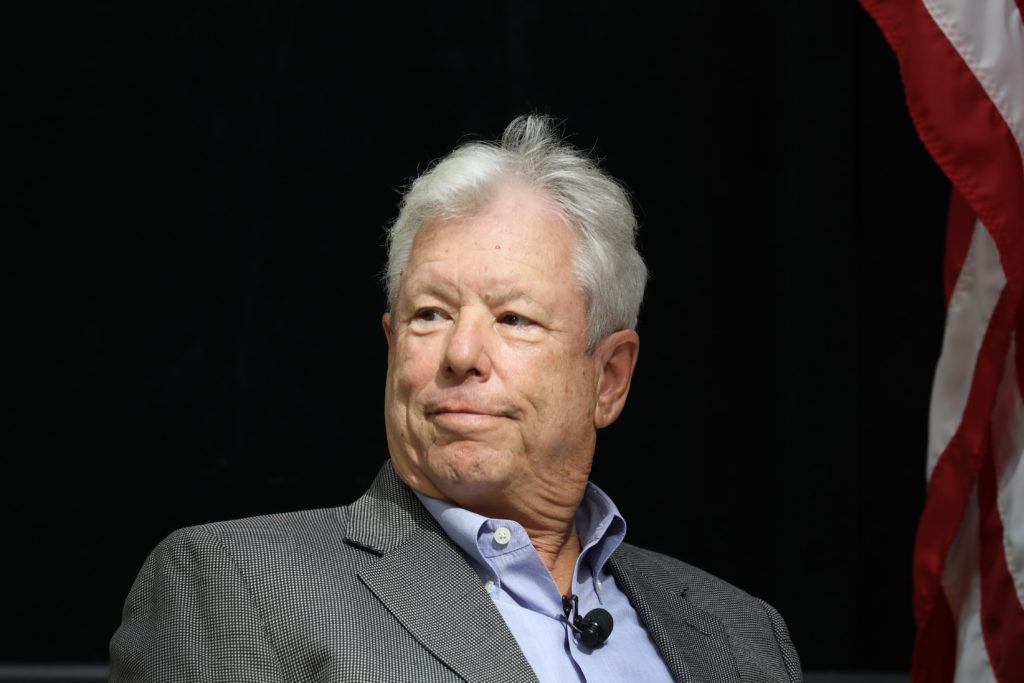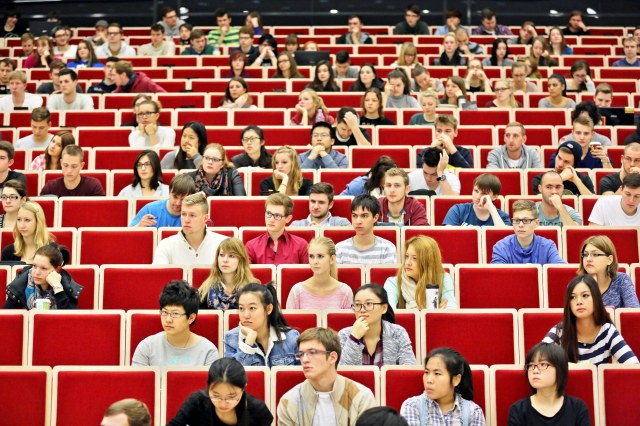Students of Economics in Leipzig, Germany. (Credit: Jan Woitas / dpa)

“Economics is a branch of practical knowledge – so economists aren’t entitled to just amuse themselves, as perhaps mathematicians are.”
These words, written by the economic historian Robert Skidelsky, appear in the preface of a newly published report into the state of economics. Unusually, perhaps, the report Skidelsky was introducing is the work of four industrious undergraduates who, concerned at what they’re being taught in their curriculum, are trying to steer the on-going debate about the state of the “dismal science”.
“Economics teaching is separate from the other social sciences, and has less diversity in theories and schools of thought,” say the authors of Educating Economists? – all of them studying at Durham University. “Students of economics insufficiently examine history, ethical frameworks, or what is happening in the world around them.”
As an economist myself, I’d say this observation is timely and true. A decade on from the 2008 financial crisis, amid growing Western inequality and insecurity, even the best universities risk failing their students and society with inadequate economics degrees. “Hardly any economist foresaw the crash – and because they were unprepared, their advice on how to respond was weak and contradictory,” Skidelsky writes. “We expect better from a discipline which claims to hold the keys to prosperity.”
This Durham report, while admirable, is not actually unusual. It’s the latest in a series of papers by students at leading departments, including Cambridge and Manchester, which point to the shortcomings of their economics training.
Before the 2008 collapse, economics courses were full of highly numerate students coveting lucrative jobs in finance. Since then, increasing numbers of young economists have become frustrated by mathematical models with little bearing on reality. Why study economics when your lectures willfully ignore crucial economic developments – rising inequality, environmental degradation, financial volatility – so often near the top of the news?
Campaigning students at Manchester, Cambridge and Durham are part of a network called Rethinking Economics that now includes over 70 university departments across more than 20 countries. From Hungary to Columbia, from Uganda to Russia, budding policy-makers are demanding their academic masters upend courses viewed as “too narrow, ahistorical and disconnected from the real world”.
Economics, as currently taught, “is insufficiently critical, and too often fails to understand social reality in partnership with other social sciences,” say the Rethinking Economics crowd.
“Neoclassical economics” – broadly, the economics of free markets – “dominates the discipline, and whilst very useful in certain circumstances, would benefit from a plurality of economic perspectives”.
Few voters “feel like the media and politicians talk about economics in a way that’s accessible”, they argue. And “with elections fought and won on economics…. if people don’t understand what politicians are doing and who they are voting for, that’s a real problem for democracy.”
I have some quibbles. Having spent time at some of the UK’s top economic departments, I would challenge the idea of an over emphasis on free-market economics. Yes, much of the modeling methodology – far too much, in fact – is based on a free-market view of the world. But the overwhelming political atmosphere at every UK economics department I know is soft Left.
Students are instructed to memorise and regurgitate abstract free-market based models. But they’re also told that the wise and virtuous path is for governments to borrow, spend heavily and significantly intervene. There are some prominent, consistently free-market academic economists – such as Milton Friedman in late 20th century America, and Britain’s Patrick Minford today. But they are a small minority.
That aside, I absolutely endorse what Rethinking Economics is trying to do. The report by the Durham students is full of great ideas, born of the same frustrations I felt as a young academic in the late-80s and early-90s. The same over-emphasis on theory remains, the same futile attempts to understand economics via mathematics.
Economics is a study of human behaviour – above all, the allocation of scarce resources between competing ends. It requires the analysis of economic, commercial and financial life in all its institutional richness – or it is nothing. A solid grounding in theory and numeracy is essential, but so too are broad dashes of politics, history, sociology and common sense. Recent economics Nobel Prize recipients have been rewarded, instead, for work establishing “certainties” and conducting “laboratory experiments” – all of which, when it comes to economics, is bunkum.
We live in tough times. Markets are volatile, trade wars are brewing and, as our societies age, we’re juggling nasty demographic time bombs. The Western world is now so indebted that “leading economies” have been creating money ex nihilo, buying-up vast swathes of their own government bonds. Yet few academic economists have much to say about such uncomfortable realities. Those who do, it seems, can kiss their chances of a Nobel gong goodbye.
Few aspects of human behaviour are more dangerous than group think – something leading economists should constantly guard against. Yet the economics profession, despite its scientific pretense, too often seeks to reinforce, rather than challenge, the status quo.
It is vital, if the subject is to regain legitimacy with the broader public, that economists engage with, and tackle, the pressing issues of our day – in a practical, rather than merely theoretical manner. And there are some signs of progress. Academic economists now spend more time analysing data, less on theoretical equations. Grant-making bodies such as the UK’s Economic and Social Research Council rigorously monitor “impact” – the extent to which academic research influences policy and business outcomes.
I know from my own role on the Advisory Board of the Centre for Comparative Advantage in the Global Economy, based at Warwick, that our top academics are reaching out. “We try very hard not only to produce top-quality research output, but also to disseminate it to the policy-making community,” says the economic historian Nick Crafts, Director of CAGE.
While all this is encouraging, following the 2008 collapse, and the ongoing low-quality of our national economic debate, the subject still suffers from a wide credibility gap. I’m heartened Nobel economists such as Joe Stiglitz and Paul Krugman (while I often don’t agree with them) have become leading newspaper columnists. Both combine world-class academic credentials with stellar writing skills and a determination to influence policy.

It’s good that the current economics Nobel Laureate, Richard Thaler of Chicago University, is an intellectual firecracker, whose research sparked an entirely new branch of the discipline – behavioural economics – taking in psychology, bias and whim.
But I’m encouraged, above all, to see young economists across the world, led by British-based undergraduates, fighting to remake the dismal science – a subject of massive influence, affecting the lives of billions. After all, as Skidelsky says: “Any economist who fiddles while Rome burns, hardly justifies their keep.”










Join the discussion
Join like minded readers that support our journalism by becoming a paid subscriber
To join the discussion in the comments, become a paid subscriber.
Join like minded readers that support our journalism, read unlimited articles and enjoy other subscriber-only benefits.
Subscribe